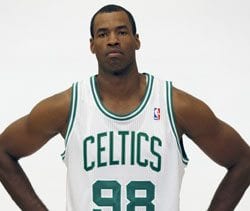

Boston Celtics great Bill Russell was an idol to many for his actions on the court, but his work as a community activist set an example for others to follow.

| Boston Celtics great Bill Russell was an idol to many for his actions on the court, but his work as a community activist set an example for others to follow. (AP Photo) |
On Monday, April 29, NBA veteran and former Boston Celtics center Jason Collins became the first active athlete in a major American team sport to announce he is gay. Some cable news and sports commentators have labeled it “a Jackie Robinson moment” for gender issues.
Though the announcement received well-earned media attention, it was yet another example of the NBA’s progressive tradition.
In January 1959, Elgin Baylor, a valuable rookie, refused to play in a regular-season NBA game in Charleston, W.Va., in protest of segregated lodging. When the Lakers attempted to check into their hotel, which had told them by mail that black and white players would all be accommodated, the front desk clerk told veteran Laker Vern Mikkelsen of the team’s three black players, Baylor, Boo Ellis and Ed Fleming: “We can’t take those three. We run a respectable hotel.”
The game was scheduled to take advantage of former University of West Virginia star Hot Rod Hundley’s local popularity. In the team locker room, Hundley implored Baylor to play the game.
“Rod, I’m a human being,” said Baylor. “I’m not an animal put in a cage and let out for the show.”
No NBA player had boycotted a game for such reasons, and it was an especially risky decision for a rookie.
Not long afterward, it was Baylor on whom then-Laker owner Bob Short banked his team’s move from Minneapolis to L.A. “If he had turned me down then, I would have been out of business,” said Short of signing Baylor. In 1958, SPORT magazine’s Murray Olderman wrote, “Never before had a major sport franchise depended so much on the individual effort of one player.”
Jason Collins’ announcement should also be regarded in light of pro basketball traditionally being more progressive concerning social issues and tolerance. In the old American Basketball League, Dr. John McClendon was hired as a black pro coach in 1962, and he also coached the ABA’s Denver Rockets in 1969, long before Frank Robinson became the first black manager in major league baseball (1975) or the NFL’s Oakland Raiders broke the coaching color barrier with Art Shell (1989).
While Collins deserves credit, his career is winding down — Baylor and Kareem Abdul-Jabbar took stands when their careers were just beginning. And in 1991, when 32-year-old Earvin “Magic” Johnson announced he had contracted HIV, he was forced to resign at the peak of his basketball powers. Magic became a leading spokesperson for HIV/AIDS awareness at a time when the virus was highly misunderstood by today’s standards.
Collins’ decision to publicly declare his sexual preference is thus the latest in a succession of landmark events befitting professional basketball’s legacy. Those comparing it to Jackie Robinson’s entry into baseball, should know that before playing an NBA game, three-time college Player of the Year Lew Alcindor began a Sports Illustrated cover story with the shocking sentence, “My name is Ferdinand Lewis Alcindor Jr, and my name is also Abdul Kareem, but I’ll explain about that much later.”
With that, in a 1969 atmosphere, the future Kareem Abdul-Jabbar opened himself to fan disapproval, player misunderstanding and media criticism. While Collins played 12 NBA seasons before making headlines, Alcindor put his livelihood, and the success of the expansion Milwaukee Bucks franchise, on the line.
Islam was highly misunderstood by a majority of US sports fans in 1969, a year when the most famous Muslim athlete, Muhammad Ali (whose denomination was much different than the orthodox beliefs of Abdul-Jabbar) was in exile because he had been stripped of his heavyweight championship for refusing induction into the armed service.
Yet few if any journalists cited the courageous stances of Baylor or Abdul-Jabbar when covering the Jason Collins bombshell.
In addition, though women’s pro basketball is not classified by mainstream media as a major sport, three-time Baylor All-American Brittney Griner announced she was gay two days after being the first player selected in the WNBA Draft.
What Jason Collins did is important, given major team sports’ role as a microcosm of society. Its significance is borne out by media reaction by individuals as varied as NBA Commissioner David Stern, Kobe Bryant, analyst Chris Broussard and NFL wide receiver Mike Wallace. His decision will also resonate with pro athletes who may be emboldened to make similar admissions. If Collins is signed by a team to play in ‘13-‘14, players will not purposely try to injure him, as pitchers threw at Robinson, or base runners attempted to spike him.
The sporting world in 2013 is a different world than it was 1947, thanks largely to basketball figures such as Baylor and Abdul-Jabbar.
Bijan C. Bayne is the author of the upcoming book, “Elgin Baylor: The First Superstar.”






